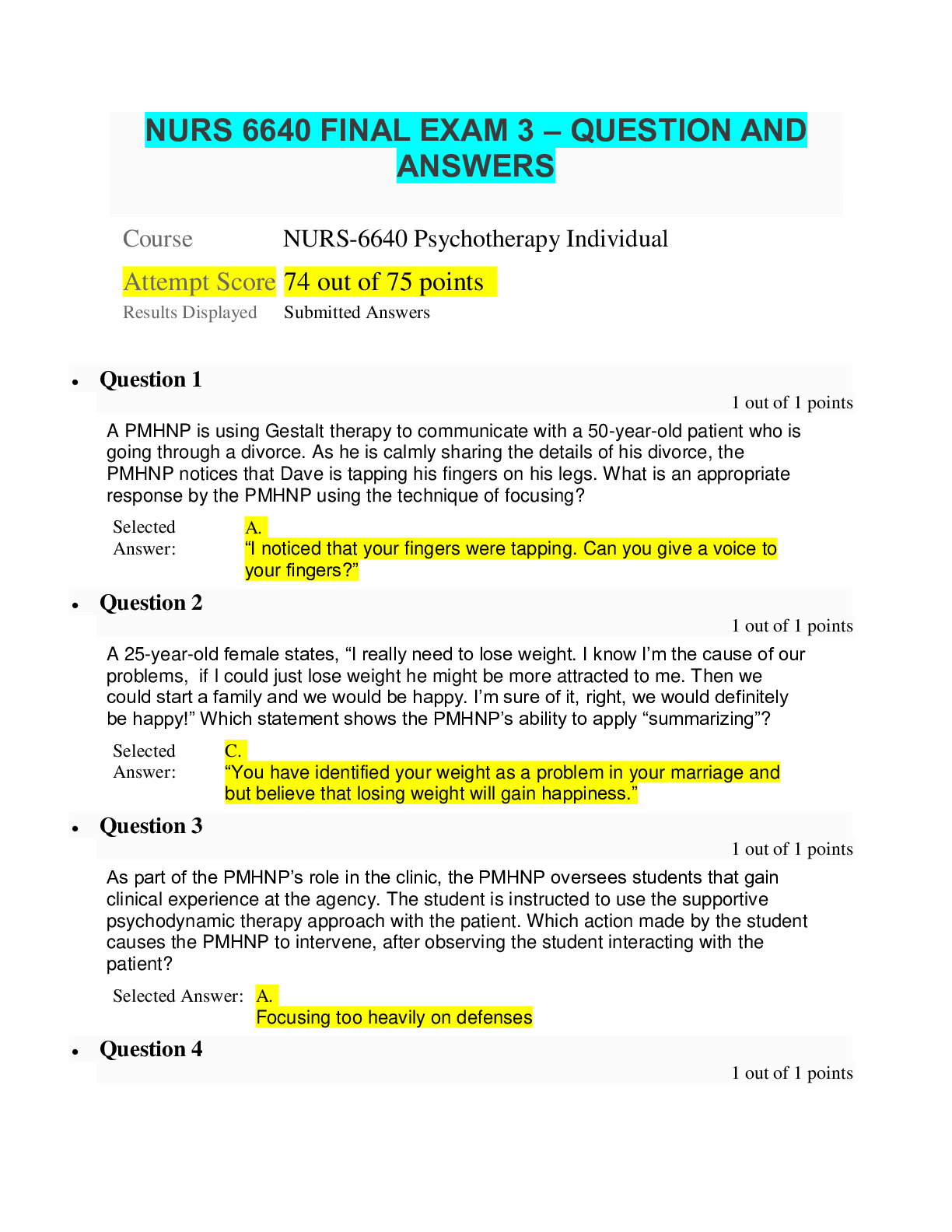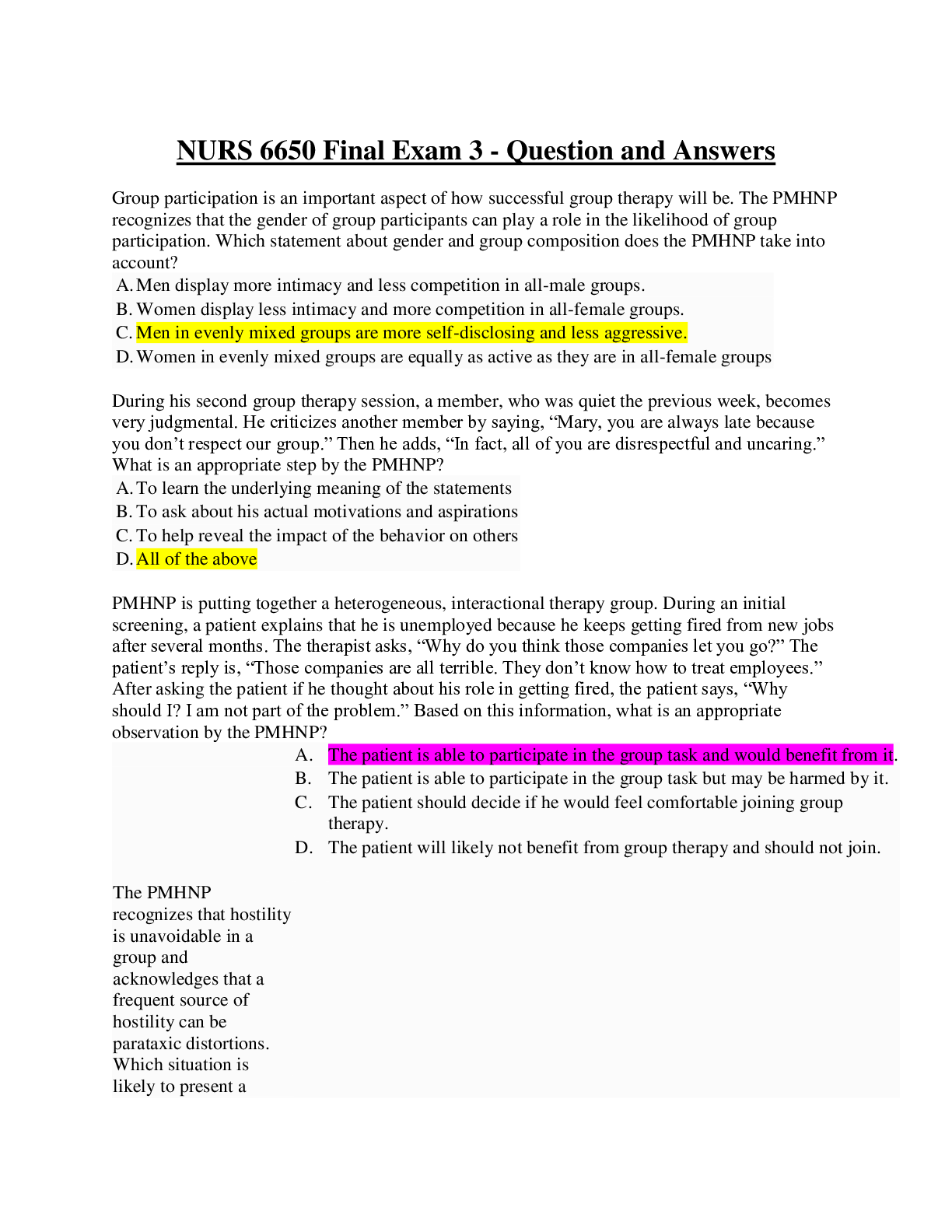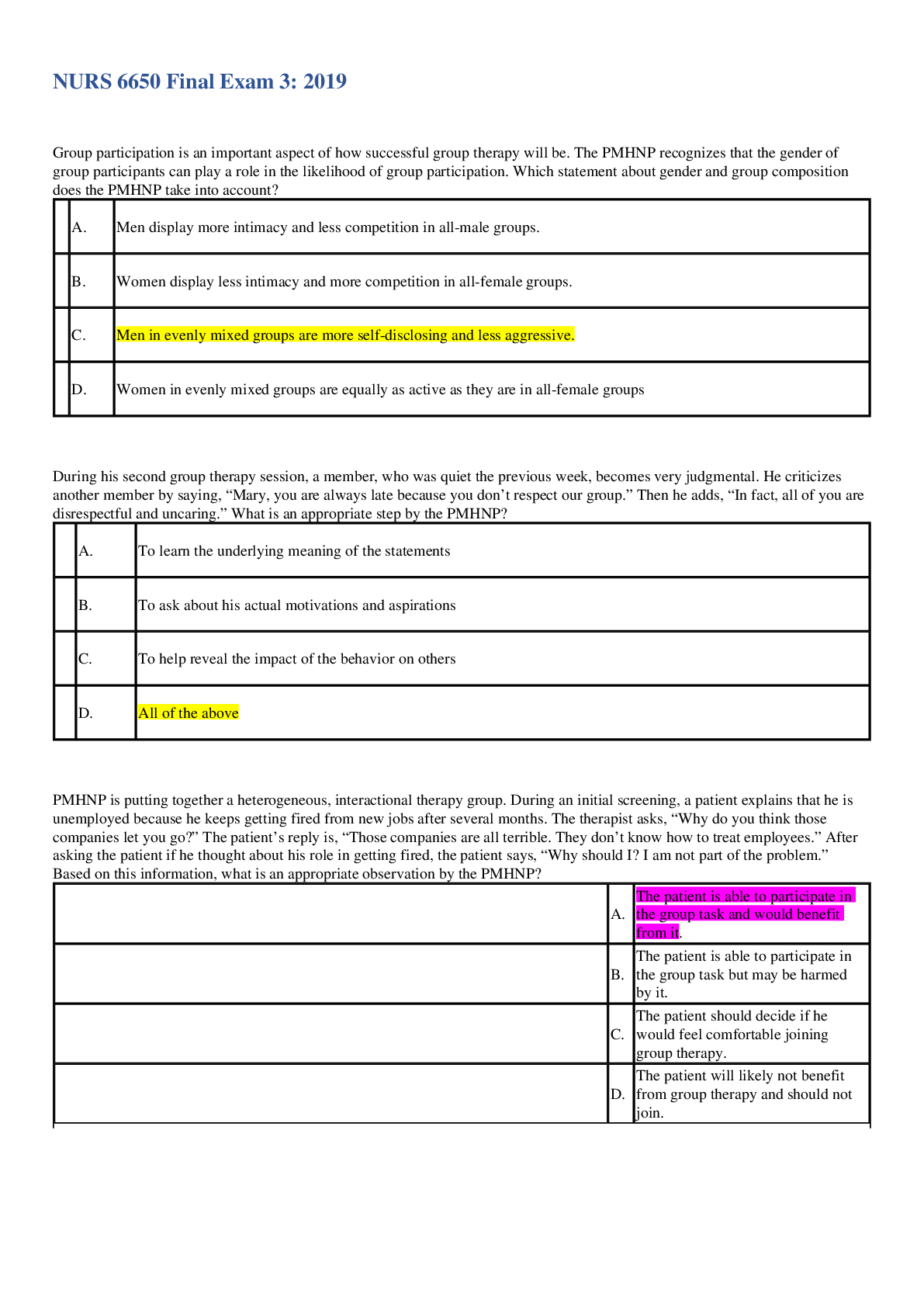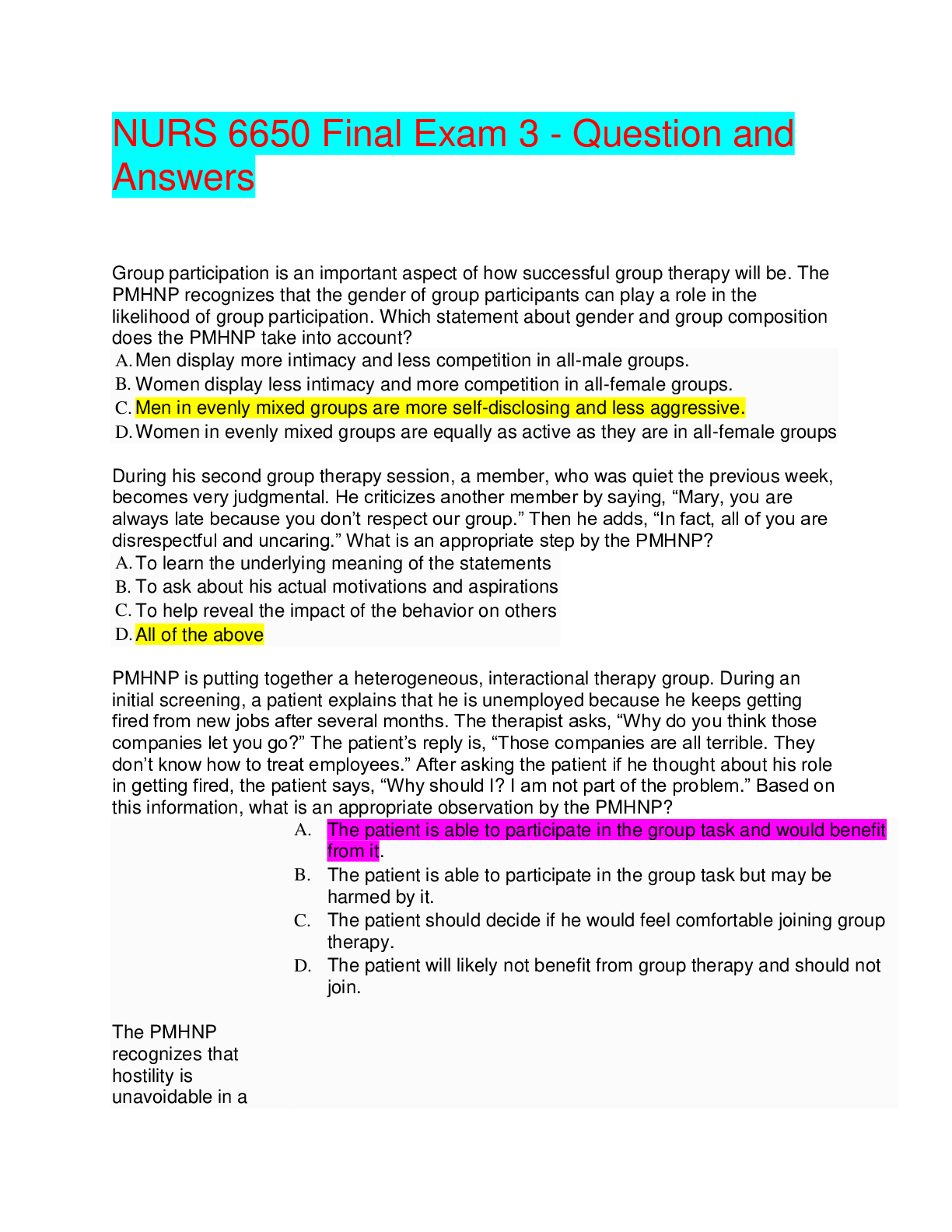NURS 6650 Final Exam 3 (Questions and Answers)
Document Content and Description Below
NURS 6650 Final Exam 3 (Questions and Answers) Group participation is an important aspect of how successful group therapy will be. The PMHNP recognizes that the gender of group participants can play ... a role in the likelihood of group participation. Which statement about gender and group composition does the PMHNP take into account? A. Men display more intimacy and less competition in all-male groups. B. Women display less intimacy and more competition in all-female groups. C. Men in evenly mixed groups are more self-disclosing and less aggressive. D. Women in evenly mixed groups are equally as active as they are in all-female groups During his second group therapy session, a member, who was quiet the previous week, becomes very judgmental. He criticizes another member by saying, “Mary, you are always late because you don’t respect our group.” Then he adds, “In fact, all of you are disrespectful and uncaring.” What is an appropriate step by the PMHNP? A. To learn the underlying meaning of the statements B. To ask about his actual motivations and aspirations C. To help reveal the impact of the behavior on others D. All of the above PMHNP is putting together a heterogeneous, interactional therapy group. During an initial screening, a patient explains that he is unemployed because he keeps getting fired from new jobs after several months. The therapist asks, “Why do you think those companies let you go?” The patient’s reply is, “Those companies are all terrible. They don’t know how to treat employees.” After asking the patient if he thought about his role in getting fired, the patient says, “Why should I? I am not part of the problem.” Based on this information, what is an appropriate observation by the PMHNP? A. The patient is able to participate in the group task and would benefit from it. B. The patient is able to participate in the group task but may be harmed by it. C. The patient should decide if he would feel comfortable joining group therapy. D. The patient will likely not benefit from group therapy and should not join. The PMHNP recognizes that hostility is unavoidable in a group and acknowledges that a frequent source of hostility can be parataxic distortions. Which situation is likely to present a parataxic distortion within the group? A. Peggy, a 54-year-old woman, acting as a surrogate to Susan, who is a younger and newer member of the group B. Jerry, a Mexican medical doctor who denies his heritage and Carlos, a proud Mexican warehouse employee C. Spencer, a Caucasian politician with a history of substance abuse, and a Caucasian therapist D. A successful entrepreneur and an aspiring spoken-word poet During a first group therapy session, a member is outgoing and participates actively. Based on this information, what is an appropriate prediction about this group member by the PMHNP? The member may be influential A patient in group therapy named Ted shares personal information for the first time. He seems nervous but continues to talk. How might the PMHNP use nonverbal positive reinforcement to support Ted’s feeling more comfortable? A. Staring intently at Ted while raising an eyebrow B. Looking at other members rather than directly at Ted C. Leaning forward and nodding as Ted shares his story D. Ignoring any members who are not listening to Ted A PMHNP is treating a 7-year-old child exhibiting signs of aggression and attention problems. Before suggesting an intervention using a common elements approach, what may the PMHNP consider? A. The therapist’s own characteristics B. The child’s goals for treatment C. How willing the child is to change D. None of the above When forming a group for therapy, which action would the PMHNP likely take as a predictor for group behavior? A. Completing standardized testing such as the Minnesota Multiphasic Personality Inventory (MMPI) B. Conducting individual therapy sessions to assess each patient’s personality style and flaws C. Inviting members that the PMHNP knows and keeping the group to one gender D. Developing a pretherapy waiting list group to be conducted four weeks prior to beginning the group During an initial screening session, the PMHNP is considering a patient for group therapy. The patient is recently divorced and says he is lonely and depressed. What is the best referral by the PMHNP? A. A long-term heterogeneous interactional group B. Inpatient cognitive analytic group therapy C. Brief, problem-oriented group therapy D. A short-term group for chronic depression The homogenous mode of composition involves a theory that relates to group composition. When applying this theory, the PMHNP is aware that the group will most likely consist of which of the following? A. Males and females of different ages, education levels, socioeconomic statuses, and professions B. Males and females of similar ages, backgrounds, diagnoses, and social status C. Males and females with an attraction to the group, aiming for a cohesive and socially compatible group D. Males and females with an ability to offer consistent self-reflection and group interactions A client is observed discussing many problems and complaints during group therapy. However, when other group members attempt to offer advice, the client does not accept it. Based on this observation, what can the PMHNP determine about the client? A. The client believes they are all there to get help and cannot accept advice from someone who the client believes is just like him or her. B. The client does not really have these problems or complaints; he or she is doing this in an attempt to get attention. C. The client is a help-rejecting client and will continue to present problems and then refuse the help of others. D. The client has so many problems and complaints that he or she is unable to focus on just one to address. In a group therapy session for patients with anxiety problems, a patient named Eve was afraid to disclose to the other members that she was a victim of sexual abuse. She kept the secret for months, although she hinted at it to other members. During a meeting, another member tried to pressure Eve to disclose her secret, but she was flustered and not ready to share. What is an appropriate response by the PMHNP? A. Encourage Eve to share her secret by showing authority and empathy B. Remain quiet and allow the group to take charge of the meeting C. Have group members conduct a role play to get Eve to self-disclose D. Tell the group it is OK that Eve does not yet feel safe enough to share During an initial meeting, a patient who has been discussing suicide says to the PMHNP, “I’m so depressed that I don’t want to leave my house. All I want to do is stay in bed.” What type of therapy would the PMHNP most likely recommend to this patient? A. An interactionally focused heterogeneous therapy group B. A structured homogeneous group for chronic suicidality C. A short-term cognitive therapy addiction group D. None of the above Following the PMHNP’s cancellation of a group session, he or she notices a decrease in compliance and attendance within the group. What does the PMHNP identify as the group’s reason for noncompliance? A. The group did not expect to have time off, so it may take up to a month to get back into a routine. B. The group members may believe that the group is not important to the PMHNP. C. The PMHNP’s absence gave the members a reason to also be absent. D. The group members feel let down, because the PMHNP cancelled a meeting. The PMHNP understands that conflicts within the psychotherapy group can be troublesome for clients and have the potential to reduce the effectiveness of the group process. As it pertains to group meetings, the PMHNP understands which statement to be true about conflict? A. Conflict exists when there is a lack of mutual respect. B. To eliminate conflict, it must be recognized and addressed immediately. C. Conflict within the group indicates a lack of growth amongst the group members. D. Conflict exists in every group and is expected to reoccur throughout the group meetings. A patient in group therapy discloses her concern about feeling suicidal again in the future. Using the principle of universality, what is an appropriate step by the PMHNP? A. Encourage other members who have similar concerns to share their feelings B. Tell the patient to believe that she will continue to make progress in the future C. Explain to the patient the mental health benefits of group therapy D. Have the patient work to correctively relive early familial conflicts According to Dr. Carlson, since Adler talked about how the social setting in which we live influences our lives, the best way parents can change their children’s behavior is to change: A. What is happening in the home environment. B. The discipline techniques used at home. C. The expectations for the child at home and school. D. How extended family members behave toward the children. In the parent consultation session, the parent discusses her son “Blake” who has changed since his 13th birthday. Dr. Carlson discusses the power conflict that the parent appears to be getting into with her son. When they discuss approaches they can use to help Blake experience increased responsibility, Dr. Carlson explains that the parent must make a commitment with her son by agreeing to: A. “Think through” B. “Do it” C. “Weigh options” D. “Try again” The anticipation of the first meeting among psychotherapy group attendees may cause feelings of dread and uneasiness among clients. How does the PMHNP demonstrate awareness and promote the success of this first psychotherapy meeting? A. By conducting a standardized evaluation for the clients participating in this group B. By assigning roles for each member at the beginning of the first meeting C. By calling clients who will be attending to remind them of the group a week prior D. By asking each member what his or her fears are as he or she joins the group The PMHNP is meeting with a married couple. The husband is 81 years old, and the wife is 78 years old. They tell the PMHNP that many of their friends have passed away over the last couple of years, and it’s making them feel sentimental about their lives and the fact that they are getting older. Hearing this, the PMHNP uses a life review approach with the couple. What action will the PMHNP employ? A. Looking for patterns of distraction between the husband and wife B. Educating the husband and wife about communicating their feelings to one another C. Having the husband and wife recall the happy and sad times they had in their lifetime D. All of the above For several months, a patient in group therapy always participated in conversation but only shared positive stories about her own life. During the next session, she finally confessed that she has been depressed and cutting herself. What is the best response by the PMHNP? A. “Why did you hide this important disclosure from the group for so long?” B. “Thank you. Remember that everyone needs to share personal information.” C. “You must feel comfortable with the group now to share this with us.” D. “Excellent. It wasn’t that difficult to share this with the group, was it?” Peter, a successful businessman, is introduced to the group during the twelfth week. Following Peter’s introduction, Joseph, a long-term member in the group, begins to lead the group and discuss all of the things that he has personally accomplished. In what way does the PMHNP correctly interpret Joseph’s behavior? Joseph is attention seeking and wants to show Peter that he is just as successful as he is. Joseph wants to show Peter how much he has grown since joining the group. Joseph is at risk for leaving the group, because a new client has been added. Joseph reveals his accomplishments, because he feels that his position in the group is being challenged. A PMHNP is evaluating a patient who has problems with authority and has trouble accepting criticism. The patient is aware of these problems and wants to change. Based on this, what is an appropriate action by the PMHNP? A. Treat the patient in individual therapy rather than in group therapy B. Accept the patient for inclusion as a group therapy member C. Have the patient start group therapy if he or she can resolve problems with authority D. Ask the patient to start group therapy if he or she takes full responsibility for the problems Question 24 A PMHNP is leading a group therapy session for patients with substance abuse problems. After a productive session in which all members participated, the following week was not as productive. In order to help the group members assume responsibility for evaluating the meeting, what is an appropriate comment for the PMHNP to make? A. “How would you compare today’s meeting with last week’s?” B. “Can you see that today’s meeting was not that productive?” C. “I wonder why everyone was so reluctant to work hard today.” D. “Next week, we will try to have a more intensive interaction.” Question 25 A PMHNP is leading a group therapy session for patients with substance abuse problems. After one member shares a problem, other members offer support, concern, and observations. The PMHNP points out that the group is offering many truthful reactions and helpful feedback. Which principle does this illustrate? A. Direct advice B. Imitative behavior C. Installation of hope D. Altruism Question 26 The PMHNP provides cognitive behavioral therapy (CBT) to an older adult patient with depression. The patient’s 41-year-old daughter and 32-year-old son attend one of his sessions with the PMHNP so that they can learn more about how to help their father. What does the PMHNP say to the daughter and son about the goals of their father’s CBT? A. “We are trying to reduce some of the symptoms your father experiences.” B. “We are trying to teach your father about skills for daily living.” C. “We are trying to cure your father so that he does not have depression.” D. None of the above. Question 27 A client has attended five group therapy sessions yet has not engaged verbally with others in the group. The PMHNP has identified the client as a “silent member.” Which statement is true about silent members as related to group therapy? A. Silent members can progress as much as others in the group if they are able to process vicariously through other members in the group. B. Silent members are silent because they have attended group therapy before and most likely have lost trust in self-disclosure to others. C. Silent members have learned to observe the behaviors of others; this allows them to make effective contributions and promote growth within the group. D. Silent members usually will hinder the group while hindering their own growth within the group. Question 28 A PMHNP is meeting with the mother of a 10-year-old boy named Malik, who has been depressed since his parents’ divorce. The mother explains that her goal for treatment is to help Malik feel better so he can become his “usual outgoing self.” She insists that she does not want him on medication. Which is the best response by the PMHNP? A. “We will come up with a treatment plan that takes into account your goals and preferences.” B. “I have a treatment plan that has worked successfully for children going through divorce.” C. “Because Malik is depressed, I think we might want to try to see if medication works.” D. “Tell me your treatment ideas, and that will be the plan we use to reach your goals.” Question 29 The PMHNP is meeting with an adult woman and her father, who is 85 years old. The father stays quiet most of the session. The daughter explains he is mad at her for “bringing him to a see a shrink.” The daughter reports that things have been tense in the house since her father moved in. The father has a history of depression, though he does not take any medication for it. In addition, lately the father seems to never sleep. “I hear him rummaging around in the kitchen, the garage, the living room, at all hours of the night. Sometimes he’ll nap during the day, but not much. This is putting a strain on my marriage, because my husband can’t sleep with all of this going on.” Which therapeutic approach does the PMHNP identify as most appropriate for the 85-year-old father? A. Cognitive behavioral therapy B. Complementary and alternative therapies C. Reminiscence and life review therapy D. Interpersonal psychotherapy Question 30 The PMHNP recognizes that extragroup behavior involves behavior that occurs outside of the group or during subgrouping. Which statement best describes extragroup behavior as it pertains to group therapy? A. Extragroup therapy should be addressed before it occurs, to prevent it. B. Extragroup behavior that is discussed in group therapy can encourage group resistance. C. Extragroup behavior discussed in group therapy can be therapeutic. D. Extragroup behavior can occur in all levels of group therapy. .............continued [Show More]
Last updated: 2 years ago
Preview 1 out of 26 pages

Buy this document to get the full access instantly
Instant Download Access after purchase
Buy NowInstant download
We Accept:

Also available in bundle (1)

NURS 6650 Final Exam (3 Versions);Q&A
NURS 6650 Final Exam (3 Versions);Q&A
By YourTutor 4 years ago
$40.5
3
Reviews( 0 )
$19.50
Can't find what you want? Try our AI powered Search
Document information
Connected school, study & course
About the document
Uploaded On
Feb 09, 2021
Number of pages
26
Written in
Additional information
This document has been written for:
Uploaded
Feb 09, 2021
Downloads
0
Views
86


























